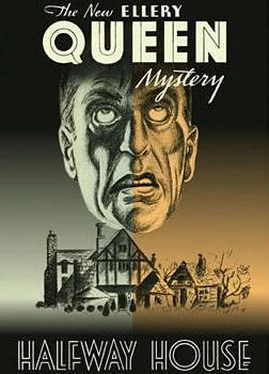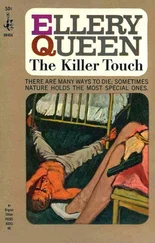Ellery Queen
Halfway House
Dramatis Personae
THE NEW YORKERS
Borden, Jasper
Finch, Grosvenor
Frueh, Senator Simon
Gimball, Andrea
Gimball, Jessica Borden
Gimball, Joseph Kent
Jones, Burke
THE PHILADELPHIANS
Angell, William
Wilson, Joseph
Wilson, Lucy
THE TRENTONIANS
Amity, Ella
De Jong, (Chief) Ira
Pollinger, (Prosecutor) Paul
“...the play is the tragedy, ‘Man’,
And its hero the Conqueror Worm.”
“Trenton is the capital of New Jersey. According to the census of 1930 it has a population — man, woman, and child — of 123,356. Originally it was called Trent’s Town, after William Trent the royal magistrate. (Did you know that, Mr. Kloppenheimer?) On the Delaware, of course. Most beautiful damned river in the whole United States.”
The dried-up little man nodded cautiously.
“Delaware? Say, this is the place where George Washington licked the daylights out of those, now, Hessians. Christmas of 1776, it was,” continued the large fat man, burying his proboscis in the clay tankard, “in a terrible storm. Old George got his boys into boats and sneaked across the Delaware and caught those Hessian baby-killers with their pants off. Didn’t lose a man — that’s history. And where was this? Trenton, Mr. Kloppenheimer, Trenton!” Mr. Kloppenheimer rubbed his dry little jaw and mumbled something placative.
“Why,” said the fat man, smacking the tankard down, “do you know what? Trenton was once almost the site of the national capital! Fact. Congress met right here in this little old burg in ’84, Mr. Kloppenheimer, and voted to lay out a Federal city on either side of the river!”
“But,” pointed out Mr. Kloppenheimer timidly, “the Capitol’s in Washington.”
The fat man jeered. “Politics, Mr. Kloppenheimer. Why...”
The large person, who looked eerily like Herbert Hoover, had been singing the glory that was Trenton into the desiccated ears of Mr. Kloppenheimer for some time. Fascinated, the spare young man in pince-nez glasses at the next table had divided his energies between the pig’s knuckle and sauerkraut before him and the monologue beside him. It took no Poesque power of ratiocination to conclude that the fat man was selling something to the timid man; but what? The city of Trenton? It seemed improbable... Then he heard Mr. Kloppenheimer utter the word “hops” and again the word “barley” in reverent breaths, and the mist lifted. Mr. Kloppenheimer clearly represented brewing interests, and the fat man no doubt was spokesman for the local Chamber of Commerce. “Ideal location for a brewery,” beamed the fat man. “Ah, there, Senator! Now, look here, Mr. Kloppenheimer...”
The mystery solved, the spare young man stopped listening. Notwithstanding the knuckle and stein before him, puzzles were his meat and drink; and there was no riddle too lean for his appetite. And the fat man had helped while away a half hour. For despite the male crowd in the small taproom of the Stacy-Trent, with its horsy red-and-white cloths and its clink of glassware behind the wooden screen, he felt a stranger in a strange land. In the shadow of the gilt-domed Capitol on West State Street, the Stacy-Trent was frequented by men who spoke another language; the air crackled with legislative talk — and he did not know a bloc from a caucus! The spare young man sighed. He signaled the waiter, ordered deep-dish apple pie and coffee, and consulted his wristwatch. Eight forty-two. Not bad. He—
“Ellery Queen, you old ferret!”
Startled, he looked up to find a man as tall and spare and young as himself chuckling down at him, hand outstretched. “Why, Bill Angell,” said Ellery, with delight in his voice. “I trust these failing eyes of mine aren’t playing tricks. Bill! Sit down, sit down. Where the deuce have you sprung from? Waiter, another stein! How on earth—”
“One at a time,” laughed the young man, dropping into a chair. “Still as quick on the trigger as ever, I see. I poked my head in here to spot some one I knew, and it took me a full minute to recognize you, you ugly Hibernian. How’ve you been?”
“This way and that. I thought you lived in Philadelphia.”
“So I do. I’m down here on a private matter. Still sleuthing?”
“The fox changes his skin,” quoth Ellery, “but not his habits. Or would you prefer it in Latin? My classics used to irritate you.”
“The same old Ellery. What are you doing in Trenton?”
“Passing through. I’ve been down Baltimore way on a case. Well, well, Bill Angell. It’s been a long time.”
“Damned near eleven years. At that, the fox hasn’t changed much.” Angell’s black eyes were steady and controlled; but Ellery fancied that the pleasure on their surface covered a certain lurking worry. “How about me?”
“Wrinkles at the corners of the eyes,” said Ellery critically. “A mastiff set to the jaw that wasn’t there, and a pinch to those very sensitive nostrils. Hair microscopically thinner at the temples. A pocket bursting with sharpened pencils — that denotes at least a receptivity to labor; clothes are careless, unpressed, and well-cut as ever; an air of self-confidence mixed with what might be termed a quivering qui vive ... Bill, you’ve grown older.”
“There,” said Angell, “ is a deduction.”
“But you’re essentially the same. Still the little boy smarting at the injustices of the world and lashing back. And a very handsome dog. Bill, I’ve been reading things about you.”
Angell flushed and picked up his stein. “The usual tripe. They never stop dishing it out. That Curry will case was a lucky break.”
“Lucky your foot! I followed it closely. Sampson — the DA in New York County — tells me it was the most brilliant piece of legal research in a year. He predicts a future for you.”
The young man calmly drank some beer. “Not in this rich man’s world. Future?” He shrugged. “I’ll probably finish behind the eight-ball, pleading small-claims cases before some liverish old goat with halitosis.”
“Always on the defensive. I recall you used to have the most chronic inferiority complex on the campus.”
“The poor man hasn’t a—” Angell showed his small white teeth in a grin. “Lay off, you mug. You’re baiting me. How’s the Inspector? I loved that old bird.”
“He’s very well, thanks. Married, Bill?”
“No, thank you . All the poor wenches I know think I’m screwy; and you’ve no idea what I think of the wealthy ones.”
“I’ve known some that were passable,” sighed Ellery. “And how is that charming sister of yours?”
“Lucy’s doing nicely. She’s married, of course. To a traveling man — Joe Wilson. Very decent chap; doesn’t drink, smoke, gamble, or beat his wife. You’d like him.” Angell looked at his watch. “I suppose you don’t remember Lucy very well.”
“Don’t I! I recall how smitten my poor adolescent heart used to be. Botticelli would have gone into fits over her.”
“She’s still a stunner. Lives over in Fairmont Park in a modest little private house. Joe’s done pretty well — for a bourgeois.”
“Now, now,” said Ellery chidingly. “What line is he in?”
“Cheap jewelry. Trinkets. Gewgaws.” Bill’s voice was bitter. “I’m afraid I gave you the wrong impression. To tell the truth, Lucy’s husband is on his own, and he’s little more than an itinerant peddler. Oh, he deserves credit; he has no family and he’s pulled himself up by his non-existent bootstraps. One of our self-made men. But I always thought my sister would do better than...” He scowled.
Читать дальше












